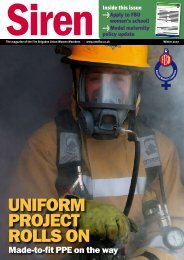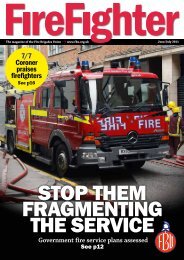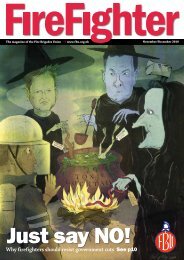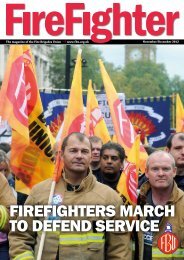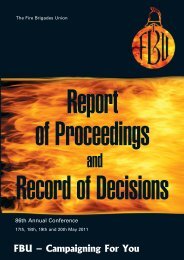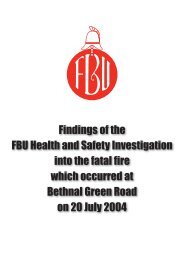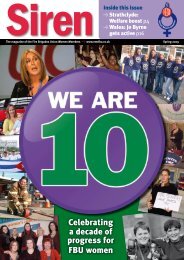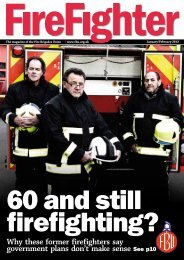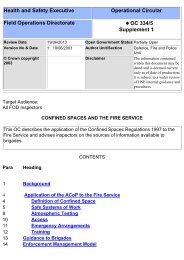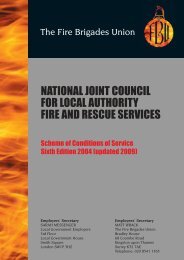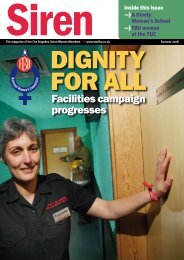Report - Fire Brigades Union
Report - Fire Brigades Union
Report - Fire Brigades Union
You also want an ePaper? Increase the reach of your titles
YUMPU automatically turns print PDFs into web optimized ePapers that Google loves.
SECTION B — FIRE AND RESCUE SERVICE POLICY<br />
of fire safety for resources. Arising from this are the<br />
following recommendations:<br />
●<br />
●<br />
●<br />
●<br />
●<br />
A partnership arrangement between government,<br />
private sectors and the third sector should be<br />
established with a view to sharing data and research;<br />
Co-ordinated access to Integrated Risk Management<br />
Plans (IRMPs) would facilitate sharing of good practice,<br />
lessen ‘reinvention of the wheel’ and reduce<br />
associated local risk planning costs;<br />
A national Integrated Risk Management Plan should be<br />
available and be an integrated part of local IRMPs to<br />
support national resilience;<br />
A sector-led Research Panel (not restricted to <strong>Fire</strong> and<br />
Rescue Services) should prioritise research;<br />
Responsibility for Operational Doctrine should remain<br />
within government, but production and dissemination<br />
should be co-ordinated by an appropriate organisation.<br />
The possible action arising from this response is for<br />
government to facilitate or encourage the formation of a<br />
sector led hub for the dissemination of sector knowledge.<br />
However, this is not a role for DCLG but rather a function<br />
for a voluntary association of fire researchers and<br />
academics. A potential threat to the viability of this is the<br />
lack of cohesion amongst the various elements of the fire<br />
sector for hub.<br />
RECOMMENDATIONS – Knowledge management<br />
●<br />
●<br />
●<br />
●<br />
A working group should be set up to review the scope<br />
for setting up a national data function, what data would<br />
be included, who would finance such a venture, what<br />
access would be allowed, and what governance<br />
structure should be set in place. This group should also<br />
review the feasibility of placing all IRMPs online.<br />
A working group should explore the scope for a sector<br />
led research panel, and develop proposals for a shared<br />
work programme.<br />
The IRMP committee should look at the feasibility of<br />
creating a national IRMP based on national risks.<br />
Technical and operational guidance should be written<br />
by experts in the fire and rescue service. This should<br />
be included in the national functions work mentioned<br />
above.<br />
5. A FIRE AND RESCUE SERVICE THAT CAN OPERATE<br />
TOGETHER<br />
While services operate primarily at the local level, they<br />
often need to respond outside their own areas, not least<br />
when dealing with major incidents. It is essential that such<br />
service are interoperable when the come together.<br />
We have considered an on-going concern of government,<br />
and that is how we ensure interoperability assured across a<br />
range of services, each operating entirely independently.11<br />
Their conclusions indicated that this is in part should be<br />
dealt with by means of the National Framework, which<br />
should set out expectations - however this will need to be<br />
underpinned by practical activity. Whilst the localism<br />
agenda aims to devolve power to as small a unit as<br />
possible there is a role for central government in facilitating<br />
interoperability, and ensuring that at major incidents both<br />
equipment and personnel can effectively operate together.<br />
In order to create interoperability across geographical and<br />
functional boundaries, an unequivocal expectation amongst<br />
the population that this will be delivered needs to be<br />
generated, and then met by fire and rescue services. This<br />
involves development of the National Risk Assessment<br />
process, underpinned by National Framework<br />
requirements. This in itself will be further underpinned by<br />
an appropriate level of assurance, feeding into local<br />
Integrated Risk Management Plans. In taking this forward it<br />
is recommended that there should be a common risk<br />
assessment protocol applied to national, local and generic<br />
risks, to enable category 1 and 2 responders to have a<br />
common understanding of the risk identified.<br />
There should be a mechanism by which the sector itself<br />
can redirect resources in support of the national interest<br />
and better use be made of commercial support options for<br />
deployment. Less onerous and bureaucratic arrangements<br />
to access latent military capabilities and assets should be<br />
established and there undoubtedly exists greater scope to<br />
involve private sector suppliers in the provision of logistics<br />
support to FRSs.<br />
In terms of assurance, it is recommended that what is<br />
currently delivered to Ministers by the National Resilience<br />
Board, should be sought for all aspects of interoperability.<br />
Assurance mechanisms should be in place for the full<br />
range of FRS service, most notably fire cover and flood and<br />
water rescue.<br />
The Group has also recognised that England does not<br />
operate in isolation. As a consequence it was agreed that<br />
some headline assurance levels should be established to<br />
ensure interoperability throughout the United Kingdom.<br />
In terms of community resilience, a range of measures<br />
have been put forward to build resilient communities,<br />
including involving communities in assessing risk,<br />
exercising their emergency plans, and using the FRS with<br />
its resources and personnel, to act as go-betweens with<br />
other organisations.<br />
RECOMMENDATIONS – Interoperability<br />
●<br />
●<br />
Government should set unequivocal expectations for<br />
interoperability across the service in the National<br />
Framework, and the local response to this should be<br />
transparent and demonstrable to the public.<br />
There should be a time limited working group set up<br />
looking at interoperability issues, in particular:<br />
●<br />
●<br />
the feasibility of FRAs themselves drawing more<br />
easily upon military resources;<br />
making better use of commercial delivery models;<br />
60 FBU Annual <strong>Report</strong> 2011





